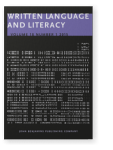Vol. 18:1 (2015) ► pp.82–103
Aer yuo looking cloesly? Even good spellers are impacted by partial cue reading
Differences in letter string processing between better and relatively poorer (average) spellers were examined. Forty undergraduate students completed a simultaneous orthographic matching task judging pairs of letter strings as same or different. Reading exposure, spelling, and reading habits were measured. Significant differences in reaction times, but not accuracy, were found between the two groups. When the groups were combined, a negative correlation was found between reaction time in the matching task and spelling ability. Taken together, these results suggest that unexpectedly poorer spellers tend to read words based on partial cues, while excellent spellers attend to entire words. Further, results indicate that processing partial vs. full cues may be a continuum, rather than a dichotomy, with even average spellers processing less than do excellent spellers. These results have implications for how unexpectedly poor spellers are defined in research and for the range of individuals who could improve their spelling by processing fuller cues.
